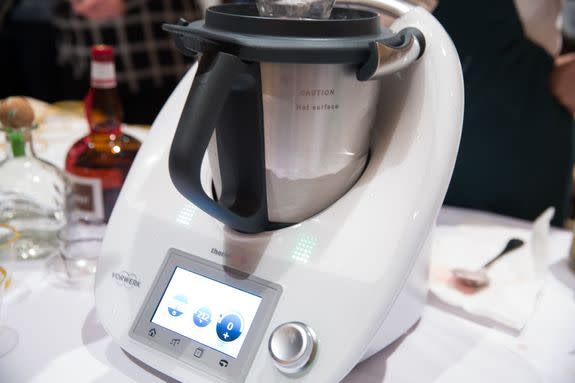CES 2017: Winners and losers

LAS VEGAS — CES is more than just a showcase of what the latest technology has to offer — it's a cage match of competing tech trends. The gadgets and technologies we'll be using tomorrow battle it out for our money and attention, and when the dust clears some inevitably come out on top.
This year's CES had a lot to say about smart homes, self-driving cars, laptops and more. There's a lot to be excited about in all those categories, but sometimes such rapid progress can leave some people behind. Here are the winners and losers of CES 2017:
WINNERS
Amazon
What? I can't hear you over the Echo! #MashCES #CES2017 pic.twitter.com/6nZiv0cWyd
— Pete Pachal (@petepachal) January 4, 2017
Anyone building a smart-home gadget couldn't wait to tout its compatibility with Alexa, Amazon's cloud-based digital assistant. Everyone saw that trend coming, but it was surprising just how powerful Alexa's draw was — even brands who don't make smart devices (like Monster) were excited to offer products, like wireless speakers, bundled with an Echo or Echo Dot. Amazon may be the most influential brand at CES 2017 to have no official presence on the show floor.
Minimalism

Image: LILI SAMS/MASHABLE
TVs have been thin for a long time, but not this thin. LG's Wallpaper TV is so thin that it makes an iPhone look fat. Thanks to OLED tech, which has self-illuminating pixels, the panels can literally be paper-thin, and they're light, too — the 77-inch model weighs just 27 pounds. LCDs are pretty austere, too, with super-tiny bezels now the norm. And short-throw projectors and transparent displays (mostly a demo right now) are making the TV disappear altogether.
Upper body strength

Image: LILI SAMS/MASHABLE
In contrast to TVs, laptops are getting big again. Models from Razer, Lenovo, Acer and others prioritize performance and gimmicks over form factor. Virtual reality is partly to blame for this trend — if you need massive graphics power, it's hard to build a slim computer. But there's also a renewed sense of experimentation, with Razer's three-screened Project Valerie and Acer's beast of a laptop with a curved screen turning heads for their strange (and bulky) designs. If you want one of these, be sure to hit the gym.
Routers

Image: LILI SAMS/MASHABLE
Somehow Wi-Fi routers are sexy again. Everyone wants a better connection, but with the proliferation of internet-connected smart gadgets, they want those connections secure, too. Routers like the Norton Core and BitDefender Box promise to keep your devices safe from digital evil-doers, and mesh-network routers — like the Linksys Velop — make it easy to blanket your entire home in Wi-Fi. Who knew routers could be sexy?
Minority Report

Image: LILI SAMS/MASHABLE
With self-driving technology now a foregone conclusion, car manufacturers had to get flashy to make an impression at CES 2017, and boy did they deliver. Toyota and BMW both showed car interiors that looked more like something from a sci-fi flick than any car on the road today. And although Faraday Future's big unveil of its first production car, the FF 91, wasn't flawless, the design was impressively forward-looking. All these futuristic unveilings guaranteed that the tech press would keep making comparisons to the 2002 Tom Cruise action-thriller Minority Report for years to come.
Personal health

Image: LILI SAMS/MASHABLE
CES had its share of ridiculous wearables, certainly. But many of the single-purpose health gadgets — like smart hearing aids and noninvasive blood analyzers — could really help people with specific conditions. And after you get past the oddness of devices like a smart breast pump, you can appreciate just how useful it could be to new moms. The rise of "treatables" is a trend worth getting behind.
LOSERS
Everybody who isn't Amazon

Image: LILI SAMS/MASHABLE
Remember when Apple HomeKit was the sexy smart-home tech? Neither do most of the manufacturers in the field, it seems, as few — if any — played up their devices' compatibility with Apple Home. Google Home wasn’t much of a presence either, although it's early days for that platform and it wasn't entirely absent (perhaps CES 2018 will be its breakout year). Other players (like Samsung SmartThings) are still around, but it seems Alexa has a monopoly on all of the momentum.
Phones

Image: LILI SAMS/MASHABLE
The smartphone is still the gateway to our digital lives, but you'd never know it from looking at CES 2017. Almost no major phone announcements happen at CES anymore, with Huawei boldly making an exception this year. Whether it's market consolidation, slowing upgrade cycles or just a down year, mobile wasn't part of the conversation at CES.
Privacy

Image: LILI SAMS/MASHABLE
Smart devices, often powered by AI, can create amazing experiences, but by their nature, they need to gather data about you, and that data can sometimes end up serving a different purpose. Whether it's marketers wanting to sell you something, or worse, hackers wanting to steal your identity, the information (and patterns around it) from your smart gadgets is a target — one that didn't exist before. As the Internet of Things gets more things, guarding your data is more important than ever.

 Yahoo News
Yahoo News 